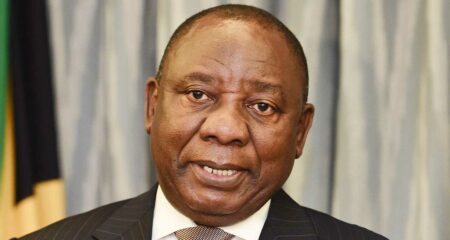
As South Africa faces its worst political crisis in a decade with thousands of protesters demanding President Jacob Zuma’s ouster, a key battle to determine who will succeed him is raging on his home turf.
The eastern KwaZulu-Natal region accounts for more than a fifth of the ANC’s members, the most of the nine provinces, and has been a springboard for Zuma’s rise to power. During his campaign to win the ANC presidency in 2007, some of his supporters wore “100% Zulu boy” T-shirts, a reference to the area’s dominant ethic group. Now faction fighting there is undermining his attempt to ensure his favoured candidate succeeds him when he steps down as party leader in December.
“In all my years in the ANC, I’ve never seen things as bad as this when it comes to unity,” said Babu Baijoo, a 68-year-old former speaker of the municipality in Pietermaritzburg, KwaZulu-Natal’s second biggest city and capital, and a party member for a quarter century. “The branches have been captured by individuals. It’s a fight for resources and positions.”
The feud has weakened Zuma’s grip on the ANC and may help deputy President Cyril Ramaphosa in the succession race. Ramaphosa’s main rival, Nkosazana Dlamini-Zuma, a former chairwoman of the African Union Commission and the president’s ex-wife, comes from the province and is Zulu. The fissures mirror a broader rift in the party, worsened by Zuma’s decision to fire Pravin Gordhan as finance minister on 31 March.
The ANC in KwaZulu-Natal has split into two loose camps. One’s led by provincial party chairman Sihle Zikalala and several of Zuma’s relatives, including Super Zuma, the province’s party secretary, and another by Senzo Mchunu, who Zikala ousted in a 2015 vote. Mchunu’s backers say the election process was flawed and have filed a lawsuit to have the results overturned. The case will be heard in August.
Zuma, 75, the ANC’s former head of intelligence, has deep roots in KwaZulu-Natal. His private home is in the village of Nkandla, the focus of a scandal that prompted the constitutional court to rule that he violated his oath of office. The court ordered him to repay the state for some of the more than R200m in taxpayer money spent to upgrade the compound by building a swimming pool, an amphitheatre and a cattle enclosure.
“The ANC needs to face the reality that at the moment it is divided,” said Mchunu, who resigned as KwaZulu-Natal premier last year after losing his ANC post. “We are going to face a decline and we are going to face a crisis if it is not already the case.”
Many ANC officials in KwaZulu-Natal are more focused on protecting their own financial interests rather than ethnic loyalty, said Benedict Dube, a political analyst at the Xubera Institute for Research and Development in the eastern port city of Durban.

“Zulu nationalism is starting to unravel,” Dube said in an interview. “As we go to the national conference of the ANC, KwaZulu-Natal is no longer a kingmaker. The centre is not holding any more.”
While the ANC leadership has barred its members from openly discussing the succession race until later in the year, the party’s women’s league has publicly backed Dlamini-Zuma, 68. The president’s comments that the ANC is ready for a woman leader have been seen as an endorsement for the mother of four of his more than 20 children.
Trade union federation Cosatu, which is in an alliance with the ANC, supports Ramaphosa, a 64-year-old former union leader.
Violent conflict
In KwaZulu-Natal, the Zikalala-led group and the ANC’s youth wing largely support Dlamini-Zuma, while Ramaphosa has strong backing among Mchunu’s followers.
When asked whether the province would support Dlamini-Zuma as president at the ANC’s December conference, Thanduxolo Sabelo, the party’s youth wing secretary in KwaZulu-Natal, said: “We are quite certain this is the view of the ANC in KwaZulu-Natal.”
In the Pietermaritzburg area, a region of rolling green hills and sugar cane fields northwest of Durban, the 35 ANC branches are almost equally split between the Zikalala and Mchunu factions, according to Baijoo. The conflict has turned violent, with six officials killed over the past 18 months, mostly in drive-by shootings, he said.
The widening divisions were evident in Durban at a 9 April memorial for Ahmed Kathrada, a prominent anti-apartheid activist and ANC member who died on 28 March. As Gordhan and ANC treasurer general Zweli Mkhize, a former KwaZulu-Natal premier, tried to address the meeting, members of the party’s youth league disrupted the gathering by chanting and holding up posters of Zuma.
“The behaviour remains unacceptable,” Mkhize, a member of ANC’s top six officials who publicly criticized Zuma’s cabinet reshuffle, said an e-mailed statement. “There is need for leadership to dismantle factions which are tearing apart the organisation and urgently work to rebuild unity.”
Zikalala acknowledged the ANC is divided in the province and said efforts were being made to mend the rift. “It’s not going to be an easy task,” he said. “Divisions are deep.” — (c) 2017 Bloomberg LP




